-
 Bitcoin
Bitcoin $82,099.5826
-1.34% -
 Ethereum
Ethereum $1,817.9545
-1.07% -
 Tether USDt
Tether USDt $0.9999
0.02% -
 XRP
XRP $2.0815
-3.96% -
 BNB
BNB $595.8647
-1.53% -
 Solana
Solana $124.0327
-0.92% -
 USDC
USDC $1.0000
0.01% -
 Dogecoin
Dogecoin $0.1634
-3.94% -
 Cardano
Cardano $0.6445
-4.65% -
 TRON
TRON $0.2336
1.34% -
 Toncoin
Toncoin $3.9381
2.61% -
 Chainlink
Chainlink $13.2201
-3.75% -
 UNUS SED LEO
UNUS SED LEO $9.0947
-5.84% -
 Stellar
Stellar $0.2646
-1.90% -
 Avalanche
Avalanche $18.6234
-3.91% -
 Shiba Inu
Shiba Inu $0.0...01214
-3.88% -
 Sui
Sui $2.2126
-6.78% -
 Hedera
Hedera $0.1604
-6.61% -
 Polkadot
Polkadot $4.0237
-1.97% -
 Litecoin
Litecoin $82.1655
-4.48% -
 MANTRA
MANTRA $6.2849
-1.13% -
 Bitcoin Cash
Bitcoin Cash $298.8203
-2.66% -
 Dai
Dai $1.0000
0.02% -
 Bitget Token
Bitget Token $4.4293
-4.57% -
 Ethena USDe
Ethena USDe $1.0000
0.01% -
 Pi
Pi $0.6976
-9.77% -
 Hyperliquid
Hyperliquid $12.5853
-0.74% -
 Monero
Monero $215.4717
-0.22% -
 Uniswap
Uniswap $5.8825
-1.85% -
 Aptos
Aptos $5.1958
-2.29%
How to choose a trusted Bitcoin wallet provider?
Prioritize security features like multi-factor authentication when choosing a Bitcoin wallet; research provider reputation and user reviews, considering your tech skills and risk tolerance to select a hardware, software, or paper wallet that best suits your needs.
Mar 24, 2025 at 11:49 am
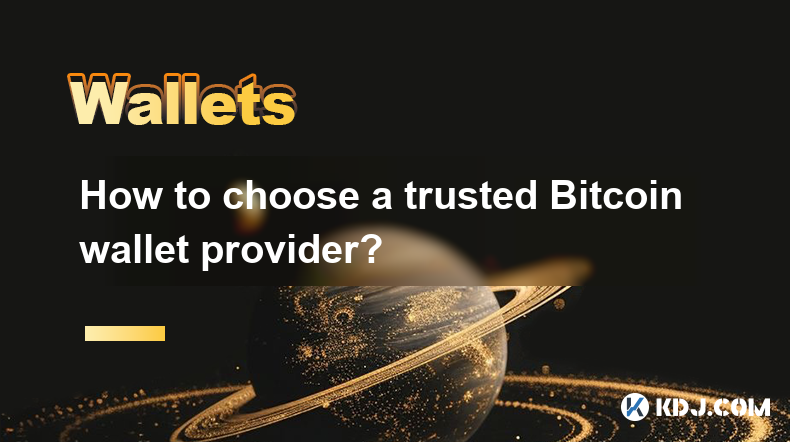
Key Points:
- Understanding your needs (security vs. convenience) is paramount before choosing a Bitcoin wallet provider.
- Security features like multi-signature, two-factor authentication, and reputable security audits are crucial.
- Consider the wallet type (hardware, software, paper) based on your technical skills and risk tolerance.
- Research the provider's reputation, history, and user reviews before entrusting them with your Bitcoin.
- Beware of scams and phishing attempts; verify the legitimacy of any communication.
How to Choose a Trusted Bitcoin Wallet Provider?
Choosing a Bitcoin wallet provider is a critical decision for anyone holding Bitcoin. Your choice directly impacts the security and accessibility of your funds. This guide outlines key factors to consider when selecting a trusted provider.
First, define your needs. Are you a seasoned crypto investor prioritizing maximum security, or are you a newcomer seeking a user-friendly experience? This will significantly influence your wallet choice. A hardware wallet offers superior security but requires more technical understanding, while a mobile wallet prioritizes convenience but might have slightly reduced security.
Next, delve into the security features offered. Look for wallets supporting multi-signature transactions, requiring multiple confirmations before releasing funds. Two-factor authentication (2FA) adds an extra layer of protection, preventing unauthorized access even if your password is compromised. Reputable providers undergo regular security audits, the results of which should be publicly available.
The type of wallet is another crucial aspect. Hardware wallets, like Ledger and Trezor, store your private keys offline, offering the highest level of security against hacking. Software wallets, available as desktop applications or mobile apps, are more convenient but require vigilance against malware and phishing. Paper wallets, essentially printed private keys, offer offline security but are vulnerable to physical damage or loss.
Thorough research is essential. Investigate the provider's reputation, track record, and user reviews. Look for evidence of transparency and a commitment to security best practices. Avoid providers with limited or negative online reviews, or those lacking readily available information about their security measures.
Remember to be vigilant against scams. Phishing attempts are common in the cryptocurrency space. Never click on suspicious links or share your private keys with anyone. Always verify the legitimacy of any communication from a supposed wallet provider before taking any action. Check their official website and contact details to confirm their authenticity.
Choosing a wallet provider involves a careful balancing act between security and convenience. There's no single "best" wallet for everyone; the ideal choice depends on individual needs and circumstances. Prioritize security features, conduct thorough research, and remain vigilant against scams to protect your Bitcoin investment.
Understanding Different Wallet Types:
- Hardware Wallets: These physical devices store your private keys offline, offering maximum security against hacking. They are generally more expensive than software wallets.
- Software Wallets: These are applications installed on your computer, mobile phone, or tablet. They are convenient but more vulnerable to malware and hacking if not properly secured.
- Web Wallets: These are online wallets accessed through a browser. They are convenient but carry the highest risk of theft due to their online nature.
- Paper Wallets: These are printed copies of your public and private keys. They offer offline security but are susceptible to physical damage or loss.
Choosing Based on Your Tech Savviness:
- Beginner: A reputable mobile wallet with good security features and a user-friendly interface is a good starting point.
- Intermediate: A desktop software wallet with strong security protocols offers a balance between security and convenience.
- Advanced: A hardware wallet, combined with a well-understood security strategy, provides the highest level of security.
Common Questions and Answers:
Q: Are all Bitcoin wallet providers equally secure?
A: No. Security features, reputation, and operational practices vary significantly between providers. Thorough research is crucial to identify reputable and secure options.
Q: What happens if I lose my private keys?
A: Losing your private keys means you lose access to your Bitcoin. There is no way to recover them unless you have a backup. This underscores the importance of securely storing your keys.
Q: How can I protect myself from phishing scams?
A: Only access your wallet through official websites and apps. Never click on links from unknown sources, and always verify the sender's identity before responding to communications.
Q: What is the difference between a hot and cold wallet?
A: A hot wallet is always connected to the internet (e.g., mobile or software wallet), making it more convenient but less secure. A cold wallet (e.g., hardware or paper wallet) is offline, offering superior security.
Q: Is it safe to use a web wallet?
A: Web wallets are convenient but carry significant risk due to their online nature. Only use reputable providers with robust security measures and be mindful of potential vulnerabilities.
Q: Should I use the same wallet provider for all my cryptocurrencies?
A: It depends on your preferences. Some users prefer using a single provider for all their cryptocurrencies for ease of management, while others prefer separating them for enhanced security. Consider the security and features offered by each provider for your specific needs.
Disclaimer:info@kdj.com
The information provided is not trading advice. kdj.com does not assume any responsibility for any investments made based on the information provided in this article. Cryptocurrencies are highly volatile and it is highly recommended that you invest with caution after thorough research!
If you believe that the content used on this website infringes your copyright, please contact us immediately (info@kdj.com) and we will delete it promptly.
- CZ Announces Plan to Donate 500 BNB Each to Myanmar and Thailand
- 2025-03-31 20:00:12
- Bitcoin (BTC -2.46%) has earned a place in almost every investor's portfolio.
- 2025-03-31 20:00:12
- Bitcoin (BTC) ETF Witnessed a Major Shift as Investors Pulled out $93 Million
- 2025-03-31 19:55:12
- Nigeria Accuses Binance of Facilitating Terrorism and Kidnapping Financing
- 2025-03-31 19:55:12
- A Sentiment Shift Appears Underway Within the XRP Community
- 2025-03-31 19:50:12
- A Quarter of S&P 500 Firms Could Be Holding Bitcoin on Their Balance Sheets by 2030: Report
- 2025-03-31 19:50:12
Related knowledge

How to easily generate a Bitcoin payment address
Mar 29,2025 at 10:49am
Generating a Bitcoin payment address might seem daunting, but it's actually quite straightforward. This process is crucial for receiving Bitcoin, as each transaction requires a unique address. Understanding how this works is fundamental to using Bitcoin effectively. This guide will walk you through the simple steps, regardless of your technical experti...
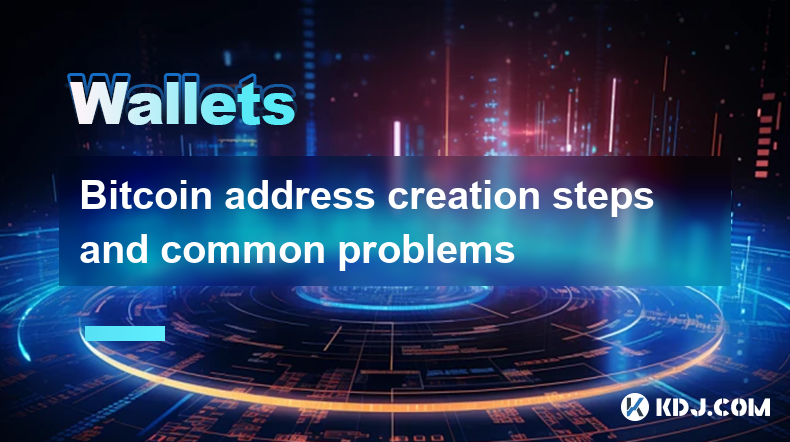
Bitcoin address creation steps and common problems
Mar 30,2025 at 06:07am
Understanding Bitcoin AddressesA Bitcoin address is a unique identifier, similar to a bank account number, used to receive Bitcoin. It's a string of alphanumeric characters generated from a public key, derived from your private key. Understanding the distinction between public and private keys is crucial for Bitcoin security. Your private key should be...
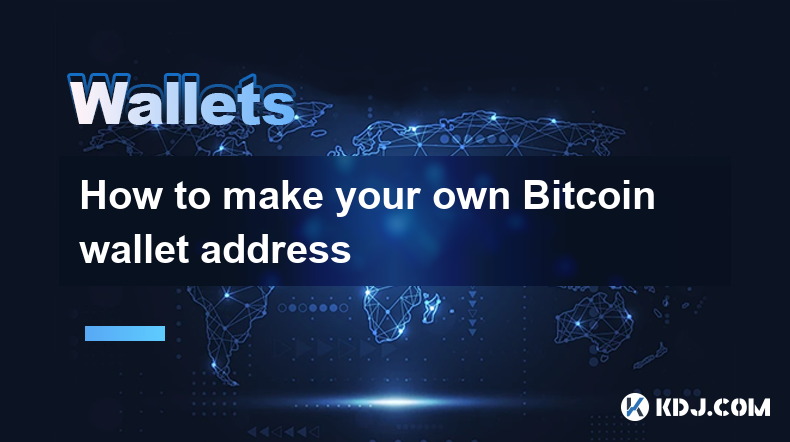
How to make your own Bitcoin wallet address
Mar 29,2025 at 08:42pm
Creating your own Bitcoin wallet address is crucial for securing and managing your Bitcoin holdings. It allows you to independently receive and send Bitcoin without relying on third-party services. This process involves understanding the different types of wallets and choosing the one that best suits your needs and technical expertise. Incorrectly gene...
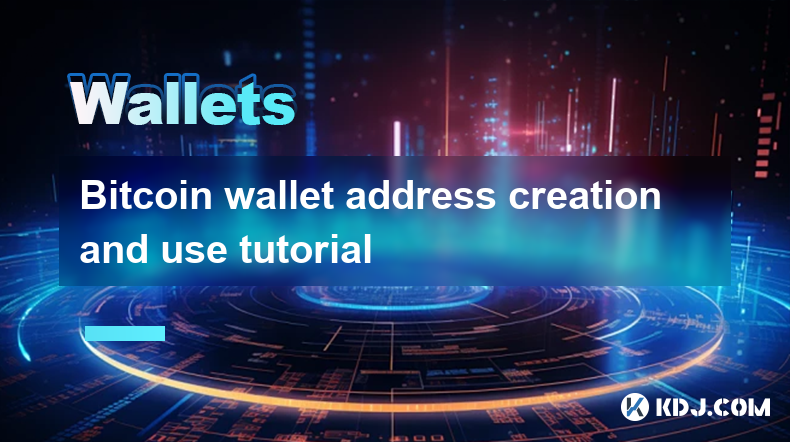
Bitcoin wallet address creation and use tutorial
Mar 29,2025 at 10:14pm
Understanding Bitcoin Wallet AddressesA Bitcoin wallet doesn't store Bitcoin in the way a traditional bank account does. Instead, it stores private keys, which are cryptographic secrets allowing you to access and spend your Bitcoin. Your Bitcoin address, on the other hand, is a public identifier, like an email address, that others can use to send you B...

Bitcoin address generation and secure storage guide
Mar 30,2025 at 08:07am
Understanding Bitcoin AddressesA Bitcoin address is essentially your public key, a string of alphanumeric characters used to receive Bitcoin. It's analogous to your bank account number. Unlike your private key, which is crucial for spending your Bitcoin, your address can be shared publicly without compromising your funds. Generating a new address is sim...
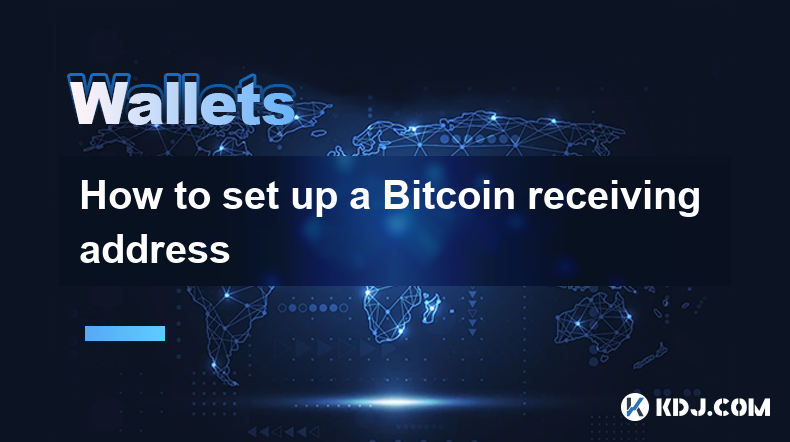
How to set up a Bitcoin receiving address
Mar 30,2025 at 06:14pm
Understanding Bitcoin Receiving AddressesA Bitcoin receiving address is essentially your unique identifier on the Bitcoin network. It's a string of alphanumeric characters that allows others to send Bitcoin to you. Think of it like your bank account number, but specifically for Bitcoin. You need a receiving address to receive Bitcoin. Crucially, you ca...

How to easily generate a Bitcoin payment address
Mar 29,2025 at 10:49am
Generating a Bitcoin payment address might seem daunting, but it's actually quite straightforward. This process is crucial for receiving Bitcoin, as each transaction requires a unique address. Understanding how this works is fundamental to using Bitcoin effectively. This guide will walk you through the simple steps, regardless of your technical experti...

Bitcoin address creation steps and common problems
Mar 30,2025 at 06:07am
Understanding Bitcoin AddressesA Bitcoin address is a unique identifier, similar to a bank account number, used to receive Bitcoin. It's a string of alphanumeric characters generated from a public key, derived from your private key. Understanding the distinction between public and private keys is crucial for Bitcoin security. Your private key should be...

How to make your own Bitcoin wallet address
Mar 29,2025 at 08:42pm
Creating your own Bitcoin wallet address is crucial for securing and managing your Bitcoin holdings. It allows you to independently receive and send Bitcoin without relying on third-party services. This process involves understanding the different types of wallets and choosing the one that best suits your needs and technical expertise. Incorrectly gene...

Bitcoin wallet address creation and use tutorial
Mar 29,2025 at 10:14pm
Understanding Bitcoin Wallet AddressesA Bitcoin wallet doesn't store Bitcoin in the way a traditional bank account does. Instead, it stores private keys, which are cryptographic secrets allowing you to access and spend your Bitcoin. Your Bitcoin address, on the other hand, is a public identifier, like an email address, that others can use to send you B...

Bitcoin address generation and secure storage guide
Mar 30,2025 at 08:07am
Understanding Bitcoin AddressesA Bitcoin address is essentially your public key, a string of alphanumeric characters used to receive Bitcoin. It's analogous to your bank account number. Unlike your private key, which is crucial for spending your Bitcoin, your address can be shared publicly without compromising your funds. Generating a new address is sim...

How to set up a Bitcoin receiving address
Mar 30,2025 at 06:14pm
Understanding Bitcoin Receiving AddressesA Bitcoin receiving address is essentially your unique identifier on the Bitcoin network. It's a string of alphanumeric characters that allows others to send Bitcoin to you. Think of it like your bank account number, but specifically for Bitcoin. You need a receiving address to receive Bitcoin. Crucially, you ca...
See all articles






















































































